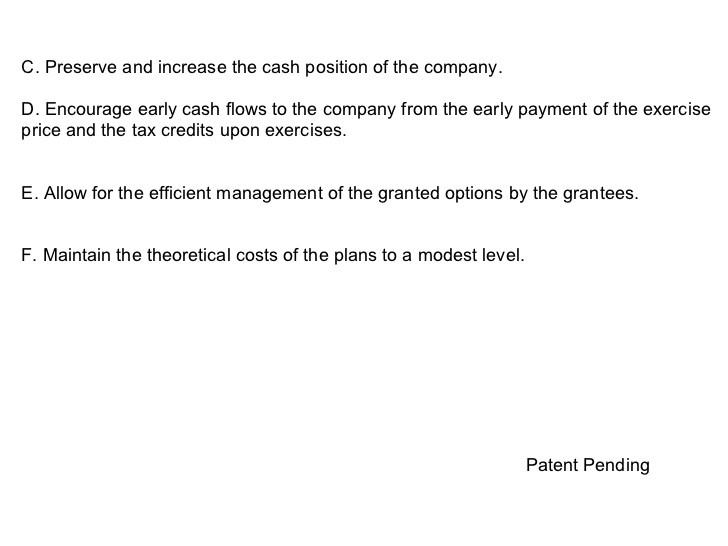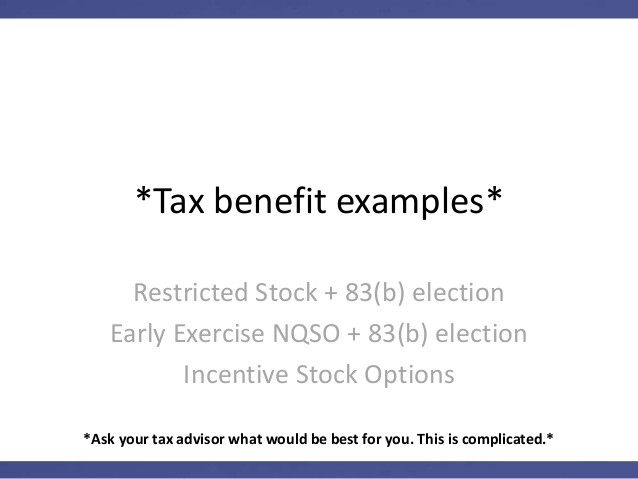Stock Options Restricted Stock And Taxes
Post on: 21 Май, 2015 No Comment

Highlights
- Most types of equity awards require you to remain employed for a certain time.
- You get more bang for your buck with ISOs, but you must meet certain requirements.
- Options, restricted stock and RSUs are subject to different tax treatment.
You’ve just received a promotion and are now eligible for equity-based compensation. Congratulations! In most cases, you stand to gain some extra money. But these perks have tax consequences.
More On Stock Options, Restricted Stock:
investing
As a result of heightened reporting requirements and increased scrutiny placed on compensation paid to key employees, public companies are becoming especially focused on awarding performance-based awards as opposed to awards that vest simply as a result of the passage of time, says Erin Turley, a partner in the law firm of K&L Gates.
Stock options
With stock options, you are given the opportunity to buy a specified number of shares of stock at a set price. The price at which you can purchase a share is called the exercise price. The exercise price must be the fair market value of the stock on the date the option is granted to you. You make money with a stock option if the price of the stock exceeds the exercise price.

Stock options are ‘appreciation awards,’ which means that they are valuable only if the price of the employer’s stock increases over the exercise price. Employees who receive stock options are, therefore, incentivized to grow the company to ensure value can be realized with respect to their stock option awards, says Allison Wilkerson, a senior associate at K&L Gates.
What kind of option have you been granted? The most common is a nonqualified stock option, or NSO (also called a nonstatutory stock option). The less common type is the incentive stock option, or ISO (also known as a statutory stock option). The ISO gets you the best deal, but it comes with some strings.
Nonqualified stock options
When you exercise a nonstatutory stock option (i.e. buy the stock), the difference between the fair market value of the shares and the exercise price — called the spread — will be included in your wages and subject to federal income tax and employment tax withholding. After exercise, you own the shares. When you sell those shares, any gain you recognize will be capital gain (or loss if you sell them at a loss).
Incentive stock options
You get more bang for your buck with an ISO. When you exercise an ISO, you do not include the spread in your income. To be able to exclude the spread from your income, you must meet certain holding requirements.
The stock acquired by exercising the option must be held until the later of:
- One year following the day the stock was transferred to you on exercise.
- Two years after the date the option was granted to you.
If you meet these requirements, when you sell the stock, any gain or loss is taxed as a capital gain or loss rather than ordinary income. This is critical. Ordinary income is almost always taxed at higher rates than capital gain. You want capital gain treatment — you pay less in taxes and keep more of your money.
If you later sell the stock but you didn’t satisfy the holding-period requirements, the gain will be divided into two pieces: The spread will be ordinary income, and the amount over that will be capital gain (just like NSOs). Be diligent in keeping track of the holding period of your ISOs.
We find that clients are often confused about the type of stock options they have and the tax treatment of each kind. They also don’t realize that there can be tax implications even if the price of the stock goes down once they exercise their shares, which can be particularly disheartening, says Patte Lee, CFP and Certified Divorce Financial Analyst of Allegiant Wealth Management in Dallas.














